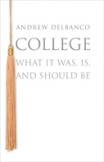Big Questions on Campus
The aim of a rigorous liberal arts education is to follow the classical Delphic maxim, know thyself. This goal concerns not merely information, but transformation. From Plato to Heisenberg and from Augustine to Mahler, we are seductively lured to conceptualize not in order to remain in the metaphysical clouds but to return to the concrete self more clarified. We are urged to analyze critically, question pointedly and weigh competing arguments to secure our own humble place within the history of ideas. Andrew Delbanco’s recent book is to be praised, for it reminds us that college should be about character formation and not a surrender to a customer service mentality that inflates accomplishments to please future employers, placate doting parents and repair fragile egos.
For Delbanco, colleges are prominent in America’s historical landscape. His words and literary vignettes emerge with the style of a gifted teacher who ponders the telos (end/goal) of college, the Aristotelian “that for the sake of which” that invites student and teacher to bring curiosity to their learning. By centering on Socratic pedagogy, he demonstrates the value of learning in the style of “show me how to think and how to choose” rather than “tell me what to think and which to choose.” The text surveys in depth the historical origins of higher education, where humanities and character formation are considered paramount to, in Emerson’s words, “get the soul out of bed” when wrestling with life’s intricate questions.
After tracing the Protestant influence, the author examines the realities behind higher education (elitism, college rankings, bureaucratization and outcomes assessment), as well as the pedagogical shift from college to university: the former, stressing discipline and moral character building; the latter, advanced credentials and research specializations. The book closes with an insightful discussion of today’s diverse student body, grade inflation woes, competition for limited resources and decentralization. For Delbanco, it is the responsibility of faculty to care for their students and engage them in serious fiscal, ethical and existential challenges that our democratic nation confronts.
Noteworthy are the multiple perspectives the author presents, all of which reinforce the value of good liberal education. For example, Delbanco recounts a humorous story of two college students who attended a performance of Shakespeare’s “King Lear.” As they left the theater, one student remarked that Lear “had it coming, he’s a real whiner.” The other student, with the critical introspection that emerges from humanities education, questioned the nature of his relationship to his own father, wondering what kind of dad he would become and how human fragility changes views on life. I recall the words of Pierre Tielhard de Chardin S.J., “Nothing here below is profane for those who know how to see.”
The term liberal arts is bandied about excessively in college promotional literature, but there is a deficiency of practical questions. How will a poetry class help a student of Shakespeare become a better father and spouse? How can studying Plato’s arguments for justice and virtue in the Republic help a falsely entitled junior become an ethical business professional in two years? What is the point of having a freshman self-professed atheist think critically about Mark’s Gospel? In my experience, teaching students what Plato said, did not say and failed to say needs to be coupled with questions about why the liberal arts matter not only in 10 years but today in their lives.
Some academics fear this approach waters down the classics by making them…practical. In my view, that is not a problem, provided texts are examined critically. The skills of sound reasoning, analytic writing and argumentation should not only boost a résumé but fashion a meaningful life. By learning how to analyze, question and weigh arguments, students refrain from their previous prejudicial and dismissive mindset. These human skills elevate one’s understanding of career, family, love and faith—the often unstated goals of good humanities education. It is the reason why I keep a file of “converted students” in my office: the ones who write to me a year, two or ten years down the road to apologize for being “that kid” in class, because they are no longer that kid. They are transformed, professional and ethical young adults with families, career challenges and restored faith in what is right, good and just.
Delbanco’s text reminds us that these questions are what make the Socratic life worth living (minus the toga). One notable deficiency is that he does not mention the contributions of the educational philosophies of certain religious orders (e.g., the Jesuits) regarding the classical liberal arts, as well as the fact that they have maintained their schools’ distinctive religious identity in competition with secular institutions. In addition, a more judicious editing of some lengthy quotations would have helped move the text along. Nonetheless, it is an enlightening book, which I have already added to my freshman philosophy syllabus.
This article also appeared in print, under the headline “Big Questions on Campus,” in the September 24, 2012, issue.








